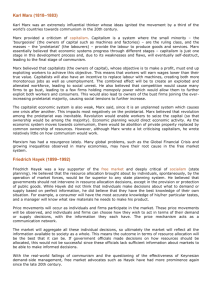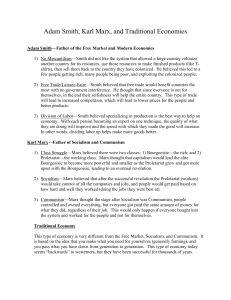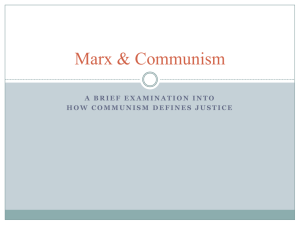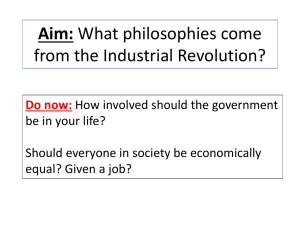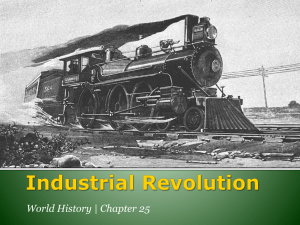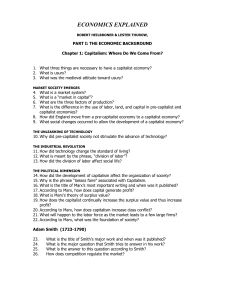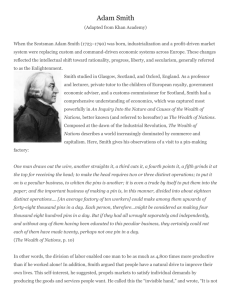Economics
advertisement
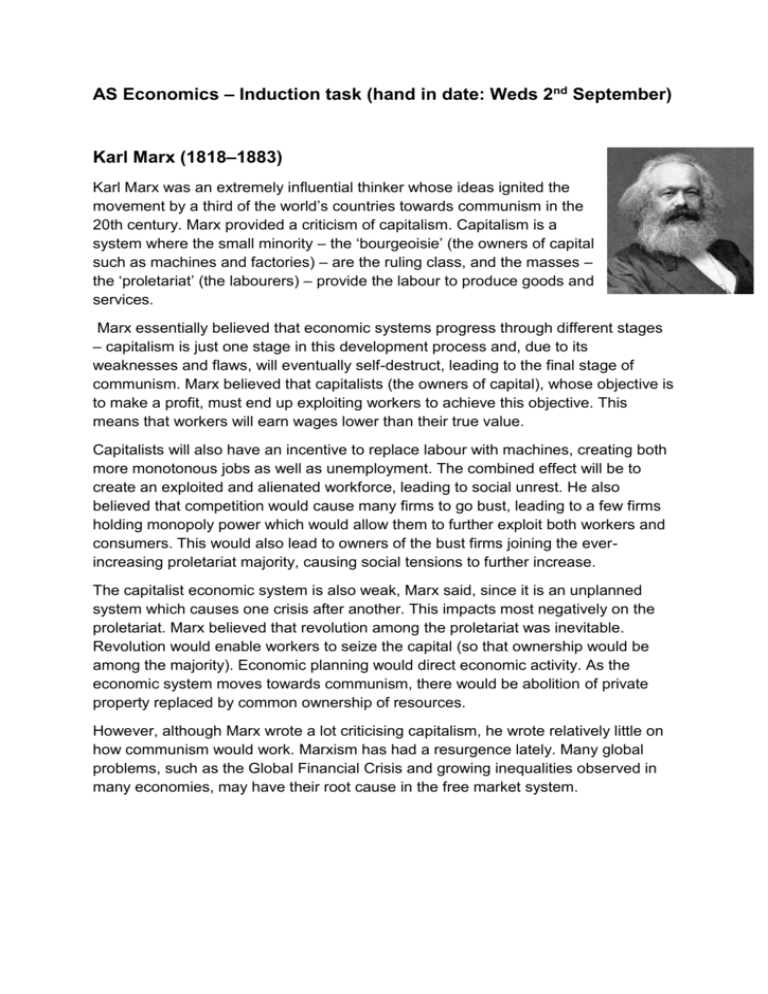
AS Economics – Induction task (hand in date: Weds 2nd September) Karl Marx (1818–1883) Karl Marx was an extremely influential thinker whose ideas ignited the movement by a third of the world’s countries towards communism in the 20th century. Marx provided a criticism of capitalism. Capitalism is a system where the small minority – the ‘bourgeoisie’ (the owners of capital such as machines and factories) – are the ruling class, and the masses – the ‘proletariat’ (the labourers) – provide the labour to produce goods and services. Marx essentially believed that economic systems progress through different stages – capitalism is just one stage in this development process and, due to its weaknesses and flaws, will eventually self-destruct, leading to the final stage of communism. Marx believed that capitalists (the owners of capital), whose objective is to make a profit, must end up exploiting workers to achieve this objective. This means that workers will earn wages lower than their true value. Capitalists will also have an incentive to replace labour with machines, creating both more monotonous jobs as well as unemployment. The combined effect will be to create an exploited and alienated workforce, leading to social unrest. He also believed that competition would cause many firms to go bust, leading to a few firms holding monopoly power which would allow them to further exploit both workers and consumers. This would also lead to owners of the bust firms joining the everincreasing proletariat majority, causing social tensions to further increase. The capitalist economic system is also weak, Marx said, since it is an unplanned system which causes one crisis after another. This impacts most negatively on the proletariat. Marx believed that revolution among the proletariat was inevitable. Revolution would enable workers to seize the capital (so that ownership would be among the majority). Economic planning would direct economic activity. As the economic system moves towards communism, there would be abolition of private property replaced by common ownership of resources. However, although Marx wrote a lot criticising capitalism, he wrote relatively little on how communism would work. Marxism has had a resurgence lately. Many global problems, such as the Global Financial Crisis and growing inequalities observed in many economies, may have their root cause in the free market system. Adam Smith (1723–1790) Adam Smith is viewed to be the founder of classical economics and was a key advocate of the market economy. The Wealth of Nations, which Smith wrote in 1776, remains a classic book in economics. His key conclusion is that, by pursuing their own self-interest, individuals would be led ‘as by an invisible hand’, with resources allocated in such a way that is in the best interests of society. He was writing at a time when most firms were owned and run by single individual capitalists who had an active, hands-on approach to running their businesses. Like today, most capitalists ran their businesses with the self-interested aim of maximising profit. Consumers also had their own self-interest at heart when making decisions about what to buy. Smith argued that these self-interest objectives, via the operation of the price mechanism, leads to the optimum resource allocation and therefore the best outcome for society. The ‘invisible hand’ enables consumers and producers to interact in the market so that both can achieve their objectives. For example, if consumers suddenly want more robot vacuum cleaners, then this will push up the price in the market: consumers are competing with each other for the existing number of robot vacuum cleaners. Firms currently in the market will react by wanting to supply more of the product since there is greater scope to make higher profits, while new suppliers will be enticed into the market to take advantage of the profit opportunity. (Smith said low barriers to entry were essential to make this happen.) More resources are then being allocated to the production of robot vacuum cleaners, which is precisely what consumers wanted. Therefore everyone is happy. Smith believed that competition in markets ensures that firms, whose main objective is to maximise profits, produce their goods at the lowest possible cost. This benefits society and ensures markets will use resources efficiently. Smith recognised the dangers of monopoly power but at the time of his writing this was not viewed as being too significant. He also believed prices would end up being ‘fair’ but that competition was essential in achieving this (low barriers to entry are necessary to prevent firms from gaining monopoly power). Smith also wrote about the process of specialisation and the division of labour, and how this production method could increase production and create wealth. By breaking down the production process into smaller, specialised parts, productivity rises. This is because this process helps incorporate some automation into the production process, which speeds up production. Workers also spend less time switching between tasks and the repetition of tasks makes their efficiency increase. Tasks (please clearly mark your name on both pieces of work) 1. Watch the video clip The World According to Marx from the BBC Two Masters of Money series, by Stephanie Flanders (www.bbc.co.uk/programmes/p00z0yb2). It is approximately four minutes long. Stephanie explains why capitalism, according to Marx, is inherently unstable and will lead to crisis after crisis. Watch the video and write a word processed summary of the key points (250 words) 2. Using the information above, produce an A4 poster which summarises the ideas of Karl Marx and Adam Smith. This poster can be word processed or handwritten but should be of a display standard. Please bring both pieces of work in on Wednesday 2nd September

